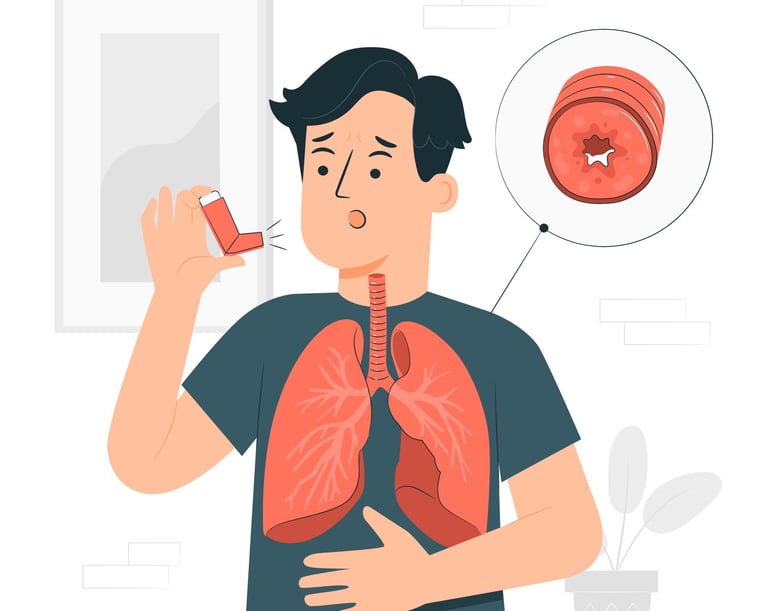

Respiratory Problems
Respiratory problems refer to a wide range of conditions that affect the lungs and the respiratory system, making it difficult to breathe or causing other related symptoms. These conditions can vary in severity, from mild and temporary to chronic and life-threatening. Understanding the common respiratory problems, their symptoms, causes, and available treatments can help individuals recognize the signs, seek timely medical attention, and manage their respiratory health effectively.
Asthma:
Asthma is a chronic condition characterized by inflammation and narrowing of the airways. Common symptoms include wheezing, shortness of breath, chest tightness, and coughing. Triggers can include allergens, exercise, and respiratory infections.
Common Cold (Allergic Rhinitis)
The common cold is a familiar ailment that affects millions of people worldwide and majorly affecting the upper respiratory system. The organism that causes common cold is Rhino Virus. Most Common Symptoms are, Nasal congestion, runny nose, and sneezing, Sore throat, cough, and mild headache, Fatigue and low-grade fever.
Sinusitis & Tonsilitis
Sinusitis and tonsillitis are two common upper respiratory infections that can cause discomfort and disrupt daily life. While they both affect the throat and nasal passages. Caused by Bacterial, viral, or fungal infections, Allergies and environmental irritants, Structural abnormalities (deviated septum, nasal polyps). Symptoms are like Facial pain and pressure, Nasal congestion and discharge, Headache, cough, and fatigue, Decreased sense of smell, Sore throat and difficulty swallowing, Swollen tonsils with white or yellow patches, Fever, headache, and ear pain, Bad breath and enlarged lymph nodes etc
Chronic Obstructive Pulmonary Disease (COPD):
COPD is a progressive lung disease that includes chronic bronchitis and emphysema. It is often caused by long-term exposure to irritants, such as cigarette smoke or occupational hazards. Symptoms include persistent cough, shortness of breath, frequent respiratory infections, and reduced exercise tolerance.
Pneumonia:
Pneumonia is an infection of the lungs caused by bacteria, viruses, or fungi. It can lead to inflammation and fluid buildup in the air sacs, causing breathing difficulties. Common symptoms include cough, fever, chest pain, rapid breathing, and fatigue.
Chronic Bronchitis:
Chronic bronchitis is a type of COPD characterized by persistent inflammation of the bronchial tubes. Symptoms typically include a productive cough with mucus, wheezing, shortness of breath, and frequent respiratory infections. Smoking is a significant risk factor.
Sleep Apnea:
Sleep apnea is a sleep disorder characterized by repetitive pauses in breathing during sleep. These pauses, called apneas, can lead to daytime fatigue, loud snoring, morning headaches, and difficulty concentrating. Risk factors include obesity, family history, and certain anatomical factors.
